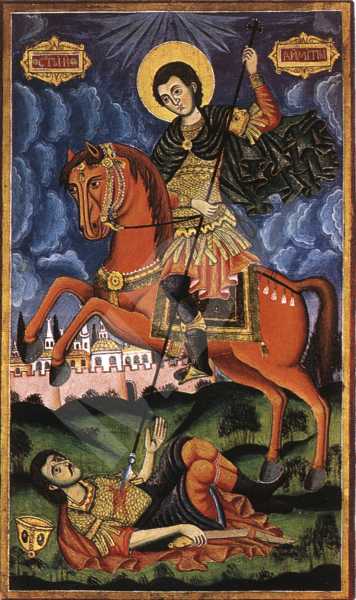St. Demetrius
Type:
Icon
Period:
From
the beginning of the
19 century
to
the end of the
19 century
Dimmensions (cm):
108
/ 65
/ 2.5
Location
Country: Bulgaria
Province: Blagoevgrad
Village: Selishte
Church: St. Prophet Elijah
Source
Country: Bulgaria
Province: Blagoevgrad
Village: Selishte
Church: St. Prophet Elijah
Description
The traditional iconographic cliche of the scene had subsequently been changed. In the place of a warrior, whom St. Dimiter is stabbing with his spear, overpainted had been a dragon (an attribute from the scene of St. George killing the dragon). Saint Dimiter on horseback is portrayed in the center of the pictorial field, facing rightwards. The saint is holding with both hands the spear, the gad of which is piercing the dragon's mouth. The reared-up horse stands on a hilly terrain. Painted in the background are urban buildings, enclosed in fortified walls.
Iconographical technique: Combined
A distemper painting with an increased content of oil in the vehicle, combined with probaster and velaturas. The modelling is executed with probaster and velaturas The carnations are painted with green overlays and ochre pigment. Rose paint is applied on the cheeks. There is some gilding on Saint Dimiter's armour and wreath, on the inscriptions in the upper two corners, on the horse's harness and on the roofs of the temples.
Base material: Wood
The base is a one-piece softwood panel, reinforced with two additional inserted beams. The ground coat is of plaster, about 0,8 mm thick.
State, restoration traces and comments
There are in various places repairs on the gilding with bronze paint. A crack in the background in the upper right corner is covered with blue paint. For unknown reasons, the dragon had been entirely overpainted to conceal the figure of the warrior. Painted in his place had been a dragon (an attribute from the scene of St. George killing the Dragon). The complete removal of the overpainted layer after a restoration has restored the icon's original painting, namely, with Saint Dimiter stabbing the warrior.


